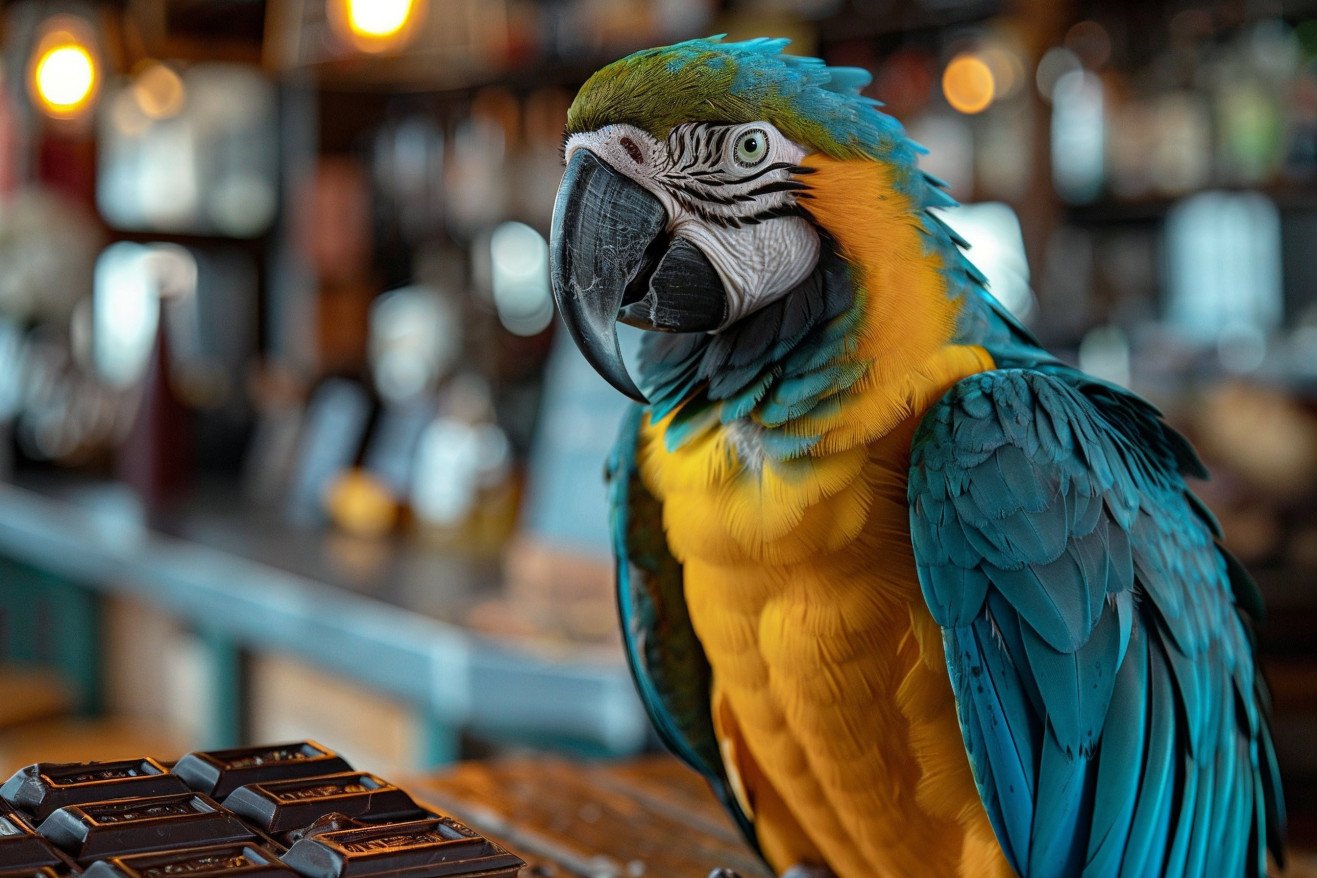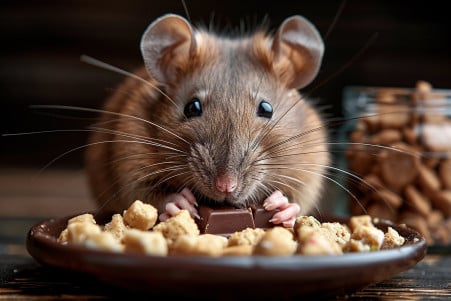Can Birds Have Chocolate? What You Need to Know
5 March 2024 • Updated 4 March 2024

Chocolate is a delicious treat for people, but the impact it has on our avian friends is definitely not sweet. Birds cannot have chocolate due to the presence of theobromine and caffeine, both of which are poisonous to birds.
When birds eat chocolate, they can experience everything from seizures to heart failure and death. It is important to make sure that birds do not have access to chocolate and to take them to the vet if they do.
This article will take a closer look at this important topic by delving into veterinary sciences and toxicology research. We will also look at how avian physiology responds to the toxic elements in chocolate and investigate case studies that demonstrate the impact of this exposure.
Finally, we will cover best dietary practices for birds to ensure that you can take the best care of your feathered friends. This information is important for bird owners and bird lovers alike.
Can birds have chocolate?
Why Chocolate Is Toxic to Birds: Theobromine and Caffeine Toxicity
Chocolate is toxic to birds due to the presence of two main compounds: theobromine and caffeine. While the liver tries to metabolize these methylxanthines, it is often unable to do so successfully, resulting in the poisoning of avian species. A study in PMC found that birds absorb theobromine and caffeine from the gastrointestinal tract quickly and distribute them throughout the body, leading to seizures, cardiac issues, and even death.
Case studies have shown the impact of chocolate toxicosis on birds. For example, a study on ResearchGate describes a Mynah bird that experienced chocolate toxicosis, including seizures and tremors, after consuming chocolate. Meanwhile, a study on PubMed discusses the death of a kea parrot, showing the lethal effects of the compounds when consumed by birds.
Birds can show a variety of clinical signs of toxicity, including hyperactivity, tremors, and gastrointestinal problems. The clinical signs are dose-dependent, with darker chocolates posing a higher risk due to their higher theobromine content. It is important for bird owners to know the toxicity levels and clinical signs so they can recognize and prevent potentially fatal chocolate exposure.
Understanding Bird Nutrition
Birds have unique nutritional needs that are critical to their survival and overall health. While birds eat a wide range of species-specific foods, including insects, seeds, fruit, and nectar, their nutritional requirements are similar to those of humans in that they need proteins, fats, carbohydrates, vitamins, and minerals, according to a study conducted by Stanford University.
Proteins are necessary for tissue growth and repair, especially during periods of growth, reproduction, and molting. Meanwhile, a study from the University of Florida found that birds need calcium for eggshell formation and overall bone health.
In addition to chocolate, other human foods are not safe for birds to eat. This is because they contain substances like theobromine and caffeine, which birds can’t metabolize. Feeding birds human food can lead to a number of health problems, including nutritional deficiencies and toxicity.
To ensure that birds stay healthy, "Today's Veterinary Nurse" recommends that birds be fed a balanced diet that’s tailored to their specific life stage and nutritional needs. This can include a variety of grains, as well as fresh fruits and vegetables.
This type of diet can help prevent malnutrition and support the immune system, which can help birds live long, healthy lives. Knowing the ins and outs of a bird’s digestive system highlights the importance of a balanced, species-appropriate diet.
Human Foods That Are Dangerous to Birds
Birds have sensitive digestive systems, and there are several human foods that can be toxic to them. According to the Veterinary Center for Birds and Exotics, avocados are toxic to birds because they contain persin, which can cause heart failure and difficulty breathing.
Onions and garlic are also toxic to birds because they contain sulfur compounds that can cause anemia, and onions can also cause ulcerations in the gastrointestinal tract. PetMD warns against the consumption of these foods because they can cause liver and kidney damage.
The Spruce Pets also notes that salt and fat are dangerous to birds; salt can cause electrolyte imbalances, and high-fat foods, like sunflower seeds, can lead to obesity and liver disease.
In addition, the pits and seeds of fruits, including cherries and apples, contain cyanide, which is a powerful cardiotoxin. While the effects of xylitol, an artificial sweetener found in some human foods, have not been well-studied in birds, it is known to cause severe hypoglycemia and liver failure in dogs, which suggests that it should be avoided by birds.
To keep birds safe, it’s important to avoid feeding birds these foods and to keep them out of their reach. In addition, birds should always be supervised and only given bird-safe foods to prevent them from ingesting anything toxic. By making sure that the environment is safe for birds, the focus can be on recovery and ongoing health rather than emergency care.
What to Do If Your Bird Eats Chocolate
If your bird has eaten chocolate, it’s important to act quickly. The first thing you should do is remove any remaining chocolate from your bird’s environment. Then, keep a close eye on your bird for any signs of distress, including vomiting, diarrhea, rapid breathing, or changes in behavior. It’s important to seek immediate veterinary care, even if your bird seems fine at first, since symptoms can be delayed.
Treatment for chocolate poisoning in birds often involves inducing vomiting and giving activated charcoal to absorb the toxins, according to Ask A Vet. In more serious cases, birds may need to be hospitalized and given supportive care, including IV fluids. After your bird is discharged, you’ll need to continue to watch it closely to make sure it doesn’t develop any additional symptoms and that it stays well-hydrated.
The prognosis for birds that have eaten chocolate is largely dependent on how quickly they receive treatment after being exposed. The long-term effects of theobromine and caffeine poisoning can be serious, but birds can recover if they receive prompt and appropriate care.
To avoid these situations, it’s important to bird-proof your home by keeping toxic foods out of your bird’s environment. Being a responsible bird owner means understanding the risks that human foods can pose to your avian pets and making sure their living space is free of potential hazards like chocolate.
Protecting Our Feathered Friends: A Summary of Avian Chocolate Toxicity
Veterinary professionals are in agreement that chocolate is a danger to birds due to the presence of toxic chemicals such as theobromine and caffeine, which can lead to a variety of health problems including gastrointestinal upset and even fatal cardiac and neurological effects. Our investigation has shown the dire effects of chocolate consumption in birds, making it clear that it is important to keep chocolate and other toxic foods far away from them.
It is our responsibility as bird owners to carefully monitor and regulate our birds’ diets, making sure that they are getting the nutrition that they need. While it can be tempting to give our birds human treats, it is not safe for them, and even small amounts of the wrong foods can have a negative impact on their health.
In closing, it is important to remember that understanding and prioritizing avian dietary health is important. This means that we need to be committed to learning and staying informed about bird nutrition and health. Let’s take the information that we have learned in this article and use it to help our birds live healthier, happier lives, making sure that our choices show that we are dedicated to their well-being.


